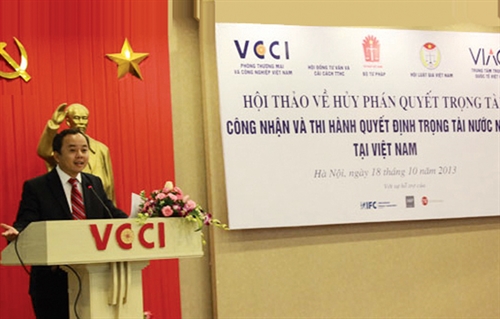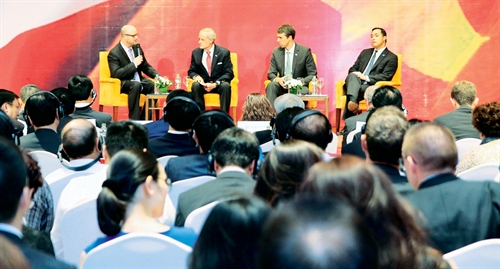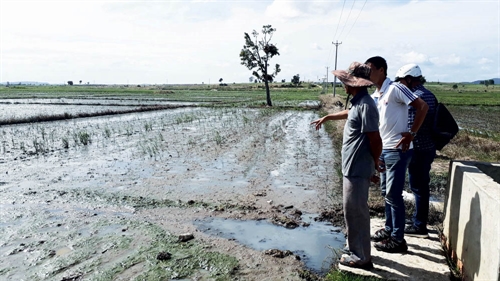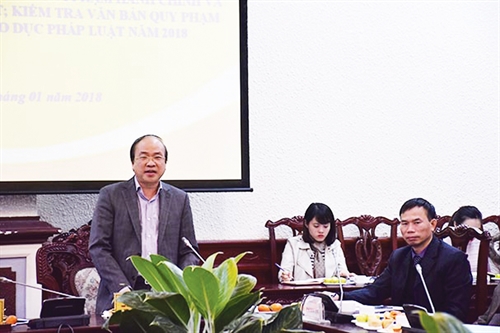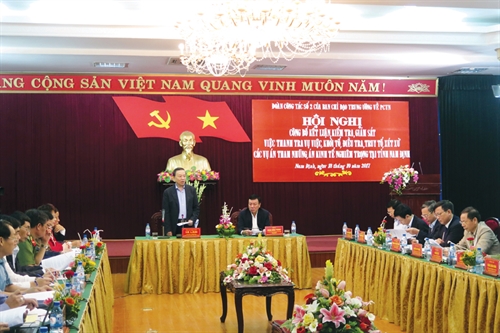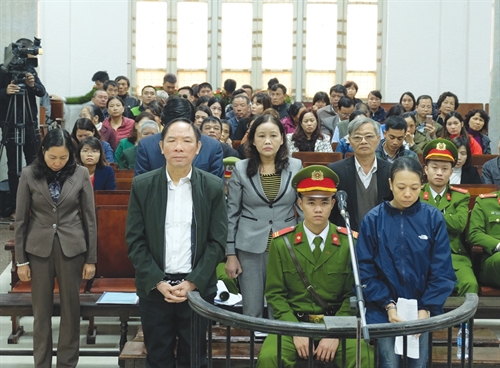Catherine Phuong and Do Thanh Huyen[1]
There is growing international recognition that financial disclosure systems help strengthen governance. Over the last three decades, more and more countries around the world have adopted financial disclosure laws requiring politicians and public officials to report on their assets and incomes. While an effective financial disclosure system can help detect and prevent corrupt practices, it can also help build public confidence and trust in the integrity of politicians and the public service.
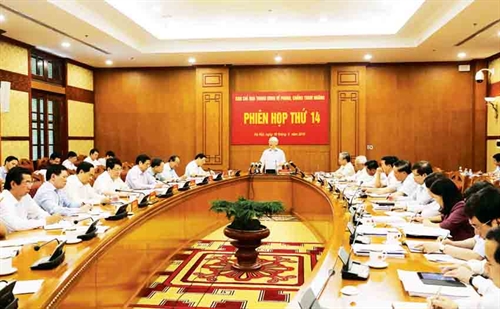 |
| Party Secretary General Nguyen Phu Trong chairs the 14th session of the Central Steering Committee on Anti-Corruption held in Hanoi on August 16__Photo: Phuong Hoa/VN |
The importance of developing financial disclosure systems to combat corruption has been recognized in the United Nations Convention against Corruption (UNCAC), adopted in 2003, to which Vietnam has been a state party since 2009. Article 8, paragraph 5, provides that: “Each State Party shall endeavor, where appropriate and in accordance with the fundamental principles of its domestic law, to establish measures and systems requiring public officials to make declarations to appropriate authorities regarding, inter alia, their outside activities, employment, investments, assets and substantial gifts or benefits from which a conflict of interest may result with respect to their functions as public officials.”
Furthermore, Article 52, paragraph 5, provides that: “Each State Party shall consider establishing, in accordance with its domestic law, effective financial disclosure systems for appropriate public officials and shall provide for appropriate sanctions for non-compliance. Each State Party shall also consider taking such measures as may be necessary to permit its competent authorities to share that information with the competent authorities in other States Parties when necessary to investigate, claim and recover proceeds of offenses established in accordance with this Convention.”
While financial disclosure systems vary from country to country, each system needs to address a number of core questions. For instance, what are the objectives of the disclosure system? Who should be required to make a declaration? What assets should be declared and to which agency? When and how often asset declaration is made? Who should verify declarations? Who should be able to see these declarations? What are the sanctions for not submitting a declaration or submitting a false declaration?
While this article does not purport to address all these issues in the context of Vietnam, it aims to provide some analysis of the current draft revised Law on Anti-Corruption (LAC) and share some international good practices which might help build a more effective financial disclosure system. This discussion focuses on three areas, namely who should be required to file asset declarations, publication of such declarations and mechanisms to verify these declarations.
Who should be required to file asset declarations?
The current proposal under Article 37 of the draft revised LAC (posted for public consultation) encompasses a large group of individuals. As currently worded, paragraph 3 seems to suggest that all public officials and civil servants would be required to file asset declarations. This could potentially result in a significant increase in the size of the filing population (currently exceeding 1.3 million filers already), thereby creating major challenges to administrative management and archiving. Such a change should take into account the fact that the ability of the Government to manage, archive and verify declarations has been limited so far. In fact, it is reported that out of 1.1 million declarations made in 2017, 78 were verified and only five cases of dishonest filings were detected.[2]
The group of individuals who are required to file asset declarations can vary quite widely from one country to another. Nonetheless, a recent analysis of asset declaration systems in 158 countries shows that almost every country among these countries (90 percent) requires Members of Parliament, the Head of Government and Cabinet Members to file asset declarations.[3]
The size of the filing population varies in each country. Among 52 countries with accessible information analyzed, 36 percent have less than 10,000 filers, 28 percent have between 10,000 and 50,000 filers, 26 percent have between 50,000 and 1 million filers. Only 10 percent have more than a million filers.[4]
In the majority of countries, family members of public officials are also required to submit asset declarations. This usually includes spouses and children. For instance, 79 percent of low middle-income countries require disclosure of family members.[5]
It should be noted that even interna-tional organizations have adopted policies on asset declarations. For instance, UNDP has developed its own financial disclosure system which requires senior UNDP officials to declare on an annual basis their assets and income other than from UNDP, as well as those of their spouses and dependent children.[6]
In a nutshell, when deciding on who should be required to file asset declarations, one should consider not just which public officials might be most at risk of corrupt behavior, but also the capacity of the authorities receiving the declarations to manage them. For Vietnam, it is suggested that the number of persons subject to annual asset declaration be narrowed down to include only top politicians, public officials at the central and ministerial levels and those holding senior positions in state-owned enterprises. In addition, those subject to income and asset filings could include deputy directors at provincial-level departments, rather than people with positions as vice heads of bureaus at all government levels.
Also, Article 37.3 of the current draft revised LAC should specify who “public officials and civil servants are” to make it consistent with Article 32 and Article 39.3. In case the article is meant to cover freshly recruited civil servants and public employees to monitor their incomes and assets over time, the article needs to specify this intention.
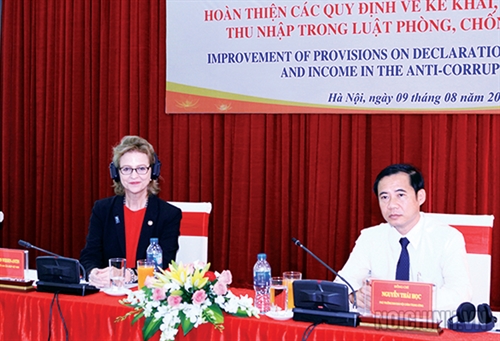 |
| Vice Chairman of the Party Central Committee's Commission on Internal Affairs Nguyen Thai Hoc and UNDP Vietnam Country Director Caitlin Wiesen co-chair a Seminar titled "Improvement of Provisions on Declaration and Control of Income in the Anti-Corruption Law" on August 9__Photo: https://noichinh.vn |
To whom is the asset declaration system open?
When it comes to restoring public trust toward public officials, it is not enough to establish a system for submitting asset declarations. The public needs to see that this system is working in practice. This is why a growing number of countries are publishing information on asset declaration as an important means to increased transparency and public confidence in the system. Indeed, in some countries, systems of asset declarations are put in place, but since no information is made available on these declarations, the public remains very skeptical about the effectiveness of the asset declarations system.
Public access to information on the asset declarations can be an effective way to mobilize society’s engagement in monitoring the assets of public officials. Publication usually triggers interest from the public, civil society organizations and the media. Countries should therefore be encouraged to share information on the asset declarations. Concerns about privacy can be addressed through a careful selection of the information which is deemed to be in the public interest and can be published.
France has recently taken some bold steps to publish online all the asset declarations, as well as declarations of interests, online. In 2013, following a scandal involving a former Minister of Budget, France adopted several laws on transparency and established a new High Authority for Transparency in Public Life. It is an independent administrative agency, with a state budget. The High Authority receives asset declarations from members of the Government, members of the National Assembly and the Senate, members of local councils, as well as their family members. In 2017, 4,327 asset declarations were received.
Anyone can consult the asset declarations and declarations of interest which have been submitted to the High Authority on the website which is available both in French and English.[7] For instance, one can see on the website what properties the current Prime Minister owns, how many bank accounts he has, how much money he has in each account, etc. The information comes from the asset declaration he made upon taking office. Everyone will be able to compare with the declaration he will make when he steps down and see whether he has gained any unexplained wealth during the period he was in office. Moreover, the sanctions for not making a declaration or not making a declaration are severe: up to three years in jail, a fine of up to EUR 45,000.
In South Korea, Article 10 of the Public Service Ethics Act provides a list of public officials whose asset information must be made public. According to the Ministry of Safety and Public Administration, 5,443 officials saw their asset declarations made public in 2014. Details about the assets owned by high-ranking officials can be consulted by any member of the public on the website of the Ministry of the Interior and Safety.[8] In a nutshell, public access to asset declarations of top-rank politicians and public officials is an effective way to monitor assets/income of public officials. This corresponds to draft regulations in Chapter VII of the draft revised LAC about the roles of the public, social organizations and the media in anti-corruption. Vietnam can take a bolder step in disclosing such information to the public, in accordance with the 2016 Law on Access to Information.
Who should verify income and asset filings?
Systematic verification and validation by a designated agency is key to ensuring the accuracy of the information which was submitted and utilized to identify risks of corruption (and detect illicit wealth). Without such verification, the system will not reach the objective of preventing corrupt behavior. The filers must believe that it is more likely than not that their asset declarations will be subject to verification at some point.
In France, the High Authority for Transparency in Public Life has the mandate to verify the asset declarations with the assistance of the French tax authorities - together, they can check that the same information about income and assets was submitted to both agencies.
Article 32 of the draft revised LAC provides a partially centralized approach to asset declaration verification as it assigns that responsibility to the Government Inspectorate, as well as ministerial-level inspectorates and provincial-level inspectorates as an alternative to the current scattered decentralization of the mandate to each state agency. This can be a good move to better control income and assets of public officials and civil servants because it assists systematic verification and validation of income and assets declared, especially when one is nominated and promoted in the public sector.
For such a semi-centralized system of income and asset disclosure system to be effective, a number of requirements should be in place. First of all, financial transactions must be made via the banking system. This will facilitate, apart from transparency of the information, regular and ad-hoc verification of the information provided by politicians and public officials, as well as mutual legal assistance in asset recovery in potential proceeds of corruption by the subject. Second, a computer-based income and asset declaration system that assists data collection and analysis is required. With this, state agencies in charge of controlling income and assets can better monitor changes in wealth. Third, in order to carry out regular, random and targeted verification activities, these agencies and their inspectorate staff must be adequately resourced and trained. Last but not least, inter-connected human resource management systems between state personnel and organization agencies and their respective ministerial- and provincial-level affiliates must be in place to facilitate such a semi-centralized system.
There are some hopes for such a move. First, the move toward e-government can facilitate this approach. Second, it should be coupled with reducing the size of subjects to income and asset declaration to persons with positions at the central and provincial levels, as discussed earlier in this article.
Final remarks
Public confidence in politicians and public officials is at all times low globally. Restoring public confidence in government has become a priority in many countries. It is tempting to develop an ambitious legal framework which requires many public officials to declare their assets. Nonetheless, one key issue remains implementation and it will be crucial to ensure that the financial disclosure system as reformed through the revised LAC is effectively implemented if it has to have any real impact.
A financial disclosure system alone cannot ensure an integrity culture in the public sector, but a well-designed and effective system can definitely contribute to preventing and combating corruption. It is therefore crucial to revisit the questions raised earlier in the article, examine the costs and benefits of any policy reform, take into serious consideration the feasibility of any policy change, and make the change consistent and intertwined with the existing legal frameworks that govern income and asset information and human resource management.
It is our hope that the suggestions made in this article provide some food for thought concerning three out of many aspects that relevant agencies in Vietnam are considering in finalizing the draft revised LAC before it is passed by the National Assembly in the 2018 Fall session.-



